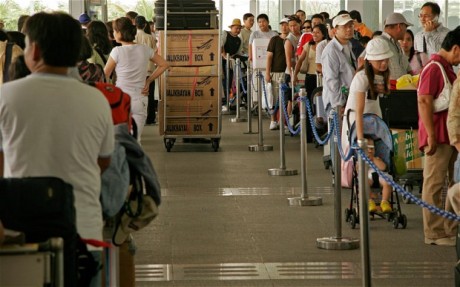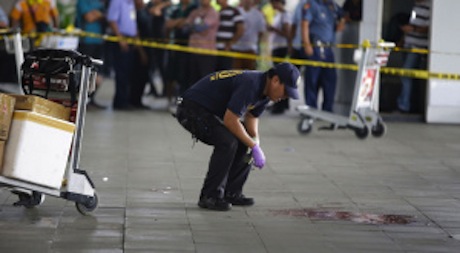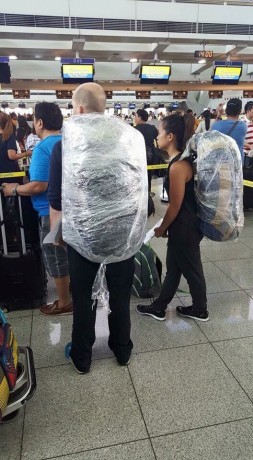It is worth pondering the state of our international gateway airport and what is says about our country. You know what they say about the eyes being windows to a person’s soul? Well, a country’s airport is a window to its governance and well-being. Think about it. The first impression that a businessman or tourist has about a country is from its airport. Apart from serving a merely functional purpose, an airport is like a calling card or a handshake for a person, or a website for a business or company. People take cues and form their opinions from these first impressions, consciously or not.
What impression do we get from the airport of Hong Kong, for example? Bustling, modern, energetic– you can almost feel the electricity in the air, with people walking briskly and purposefully through the terminals. You are brought seamlessly from the airport to the center of town via a super-fast express train. True enough, the same airport traits apply to Hong Kong itself.
Singapore’s Lee Kuan Yew, recognised the role of the airport in promoting a country’s image. He personally saw to it that anybody arriving in Changi airport got the distinct impression that Singapore stands for cleanliness and order. You can see it in the immaculate and orderly airport the moment you arrive. No detail is missed. It is efficient as in any process engineer’s fantasy dream. Even the trees and flowers lining the road from the airport to the city are manicured regularly, because as Lee put it, “I want every businessman and foreign investor to see it and get the message that the government of Singapore stands for no corruption and pays attention to the details. The government will make sure everything is running properly, in the same way that we keep these trees and flowers trimmed and watered regularly. You are therefore assured that the government will do all in its power to keep the business climate healthy, with the same due care. Your money is safe.”
| SUPPORT INDEPENDENT SOCIAL COMMENTARY! Subscribe to our Substack community GRP Insider to receive by email our in-depth free weekly newsletter. Subscribe to our Substack newsletter, GRP Insider! Learn more |
To this day, Changi Airport consistently ranks among the best airports in the world, and Singapore typically ranks among the top countries in the world for competitiveness and ease of doing business.
Now let’s take a look at Manila’s international airport.

There are valid reasons why NAIA has ranked among the worst airports in the world. The first thing you notice is that you have arrived in an obviously poor country. Now there is nothing wrong with having a limited budget, but poorer countries, such as Vietnam and Indonesia, have airports that are more modern and functional than ours. India has a noisy and corrupt democracy like ours, but Delhi has a far better airport. China’s second tier city airports are even much nicer than Manila international airport. So are Bali (Indonesia) and Koh Samui (Thailand) airports, which take in high volumes of tourists.As a young person entering the work force, one is often told to invest in a nice suit or barong. Practical fashionistas will tell you to buy the best shoes you can afford. The Manila airport is the equivalent of somebody wearing a sando and tsinelas to a job interview. It says, “I am only good enough to wash your car, water your garden and watch your kids.’ And we wonder why our Asian neighbors are snooty and look down on us.
The minute you land you feel unsafe, feeling that nobody is in charge here. The bathrooms, though already improved from years ago, still cannot match world standards (at least now the taps work and there is usually running water). The immigration lines are slow, the people manning them always seem to have just come back from a meal or a siesta. Your bags take forever to come out on to the conveyor belt and you fear somebody has opened them behind the scenes. Once you get out, it is chaos, with a throng of people in sandos and slippers teeming behind barricades, waving and jeering, as if from behind prison bars. Relax folks, these are just excited Filipinos who may or may not be meeting arriving loved ones who bear gifts from abroad. Honestly, some of them are just there because they have nothing better to do and they feel like people watching; others are looking for prey to scam.

You will be approached by various suspicious looking characters offering everything from sex, to a ride to the city at 10x the normal taxi rate (but hey, you get to skip the taxi line which is a mile long and does not seem to be moving). You will see rich locals navigating these hardships easily. They have their coping mechanisms: the friendly airport contact who gets a christmas gift every year, the car and driver that has been waiting perhaps a full hour ahead of time.

Nowadays, I don’t think anybody hands money clipped with their passports anymore. Customs is a breeze now, with the Philippines emulating the “Nothing to Declare” lanes of other countries’ airports. You don’t get scammed anymore as a matter of routine, but as a matter of bad luck and an exception.
In other words, the Manila airport, our common international gateway for visitors and returning Filipinos, is an accurate barometer of the state of the Philippines. There has been some improvement, but that is off a very low base. Overall, the airport, like the country, is mismanaged to the point that makes people want to shout and wring necks. The airport’s, and the country’s, managers are oblivious to reality and are deaf to feedback. The most frustrating part of it is that they don’t know any better; they actually think they are doing a good job. Why? Because they are in power and power in the Philippines is an ends in itself; they don’t need to earn it or prove anything, it is theirs by right.
However, even as the Philippines’ rulers remain deaf, complacent and arrogant, the people are becoming increasingly aware and short of patience. As more Filipinos have lived and travelled abroad it has become painfully obvious that life does not have to be this hard. In most other countries, you don’t get stuck in traffic for 5 hours whenever it rains. The streets don’t flood, the trash gets collected, the basic government services work. Even in some of our neighboring countries, you dont have to habitually lock everything down at night for fear of being robbed and murdered in your sleep. If you work hard, along with a little luck and perseverance, you can be comfortable, feed and educate your children. There are parks and facilities for recreation in other cities as a matter of the people’s right, and not only as a privilege for those who can afford it. There is ample water, electricity and yes, internet access.
With the recent unfolding and resurgence of the laglag bala scam, we are reminded that our airport, and our country, has
fallen so far behind. We are reminded that our leaders are ineffectual and are only nominally in charge. Finally, we are reminded that our culture and outlook have degraded, through countless years of numbing abuse, have degraded so far that we have lost the facility of holding our leaders accountable. We have lost all feelings of entitlement–that we deserve better. After all, living in a mess for years on end does that to a people; they become cowed and fatalistic. The most common expression you will find among Filipinos now is the shrug. Nobody knows, nobody cares, we are all just guilty bystanders as our leaders continue their arrogant rule.
What the airport needs is what the country needs. Our problems have to be analyzed like a computer problem and solved as a system, not piecemeal. We have to learn to recognize what are root causes and what are symptoms, and not confuse one for the other. Then we have to try different solutions, much like you iterate solutions for a math problem. We may have to be willing to make sacrifices and question our basic beliefs. If we find out it still does not work, we take our learnings from that failure and go on to the next experiment, the next possible solution.
We should watch and see how our leaders solve (or not) this laglag bala problem. That will be yet another sign of their capabilities and their approach to problem solving. What holds true for the fate of our airport, holds true for the fate of our nation.
- On that word “Manigong” - January 1, 2018
- Nice try, Florin Hilbay - October 6, 2017
- Galit sa Gulay – A Case Study - February 6, 2017
Good… this article is about politics not personalities… I guess because the author is not a Filipino… I have had my learning curve on that as well here in Germany… do not expect too much passion in a country run by big fat men wearing glasses… now WTF do I mean by that… well read this: http://filipinogerman.blogsport.eu/personalities-versus-politics/
Irineo, yes I read your piece when it came out. I agree our politics is focused on personality. That is a result of our US style presidential system, as much as our culture of patronage politics and beauty pageants. As for not being Filipino, well…I am as Filipino as Joe America. :). Btw, I also had a Luna piece recently…
Brilliant analysis of the fully unacceptable situation that exisits in the Philippines and what potential solutions might look like. But I do object to Salazar’s quip;” this article is about politics and not personalities…I guess because the author is not Filipino…” so what if we’re not filipinos we have lived here for several years and expeirence the same tribulations as any other Filipino resident. We should therefore haver a right to express ourselves freely on what ails this place without5 being tagged as a “Foreigner”…it is really insulting and belittling when people do that to us…afterall most if not all of us pay taxes just like you and unliike you we have nothing to say about how things are done because we cannot even VOTE.
Thanks Fergus. I agree with your point about foreigners totally. Everyone who lives here should have a right to air their views and voice their grievances.
This article is honest and straightforward even if it was cautiously written. Where we might have cheered a starker and a more blunt assessment, this piece seems to have taken into account ”Filipino sensibilities”. The fact that a foreigner wrote it, one who had been to other countries and their airports, to my mind, gives the piece more credence and authority. Thanks to the author, we now have the view of the Philippines, as reflected by her airports, from a thoughtful traveler. As Filipinos, we tend to claim exclusive rights to chide and bash ourselves for our failings.. and bristle at the thought that a foreigner might be observant and frank enough to talk about it. This is so parochial, insular and petty. These regressive attitudes could only stunt our growth and guarantee mediocrity. Our thanks to the author for his interest in the Philippines.
Thanks vagoneto. I’m glad you liked it.
Try reading this:
It’s More Fun In The Philippines x Bad Experience/Different Outcome For Tourists = REAL PAINFUL BACKFIRE!
Nice one, Sean. Very true. More Fun is a great slogan but the sligan preceeded any preparation to get the product ready, i.e. in terms of the right tourist infrastructure, flight connections, security, etc. A case study in not thinking things thru.
What can you expect from leaders, like Aquino and Abaya? Both of these people are incompetent.
“Lag Lag Bala” scams have been going on for many years. However, Aquino and Abaya, just looked the other way.
I still call the airport: Manila International Airport. Although, of its dirtiness, it is not worth calling it: “Ninoy Aquino International Airport”. Ninoy Aquino was a Political Opportunists. He was murdered, because of his support of the NPA. A traitor cannot be a hero.
Scamming people is the number one industry in our country. Next is Politicians stealing from the National Treasury.
In 2011, my family and I went back to the Philippines to visit. As expected, the airport was a mess and only one toilet stall in the airport was fit for use (and only after I used wet wipes to clean up). In the waiting area, I saw fellow Pinoys just throwing or leaving their garbage on the floor or on the seats.
When we were finally boarding, I was making this observation with an obviously irate tone. Someone must have heard me, because they started saying loudly, in Tagalog: “Hah! Some people think that just because they’ve gone abroad that they can just diss the Philippines! Well, if they like the airport abroad so much, they shouldn’t come here anymore! We don’t need them!”
And then, a bit later, from some other lady: “And if they really wanted us to use the garbage cans, the ones in charge should put more of them and closer to where we sit. Why should I walk all the way there to throw a few candy wrappers away?”
All of them punctuated by “Sus, ang arte talaga. ‘Kala mo kung sino.”
As long as all Pinoys think like that, you can have the best infrastructure out there and still end up with the ugliest airport in the world.
I have discovered that whenever you criticize anything about the Philippines, there is a segment that reflexively tries to shout you down. This is a mistaken and immature sense of nationalism where “mother” is defended, no matter what, even if mother happens to be a murdering crack addict who abandoned her kids. These cavemen do not understand that we criticize because we care, and we hope for a better country. As more and more Filipinos experience travel and life abroad, the comparison becomes blatant and hard to deny.
Institutions and leaders are at fault. If there were enough trashcans, if the layout of the airport were better, if the personnel treated people with respect, then the people would stop acting like animals. The institutions and leadership form an “infrastructure” that shapes the culture.
NAIA is still a mess. getting to the exit and having 10 people try to cheat you on the taxi ride to wherever you are going is definitely a turn-off and just a warning sign to anyone that can read.
People entering the country in Manila usually realize they should have gone through Cebu, although that is almost as bad.
Something as basic as taking a taxi from the airport , extremely difficult. Other countries have this solved. Indonesia , Thailand, Malaysia….all of them have solved this basic issue.
You are right, Cebu is slightly better. Although it gets far less traffic, so hard to compare.
Amen. I hate it when people approach me at the airport offering anything. Any tourist-friendly destination should have signs and maps able to point directions and provide information to anyone who has at least one eye and a minimal amount of common sense, without having to ask ANYONE.
It’s only when I give up figuring things out that I will approach someone at the counter and ask. Till then – WAIT you annoying flies who just spotted shit!
Warning to all tourists: you are in for Gullible’s Troubles the moment you land on PH cement, so try to survive by smooth talk the way Gulliver did. Otherwise be prepared with a deep pocket – the whiter your skin, the bigger the amount you’ll need to get off the hook.
And by the way – Good luck, you’ll need loads of it in the land where Murphy’s law reigns supreme.
haha Gullible’s Troubles is right.
That ailment is called “it’s every man [woman] for himself in the Philippines.
we are all orphans. our government does not give us the right environment to pursue our happiness. Worse, it gets in the way.
It is the beginning of wisdom when you recognize that the best you can do is choose which rules you want to live by, and it’s persistent and aggravated imbecility to pretend you can live without any.
that is why I choose exile…